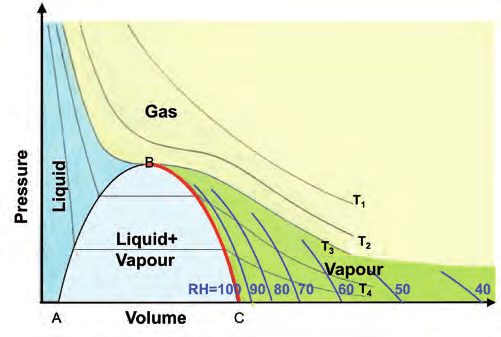
Propriétés des fluides du réservoir - PVT
PVT Course 5
This course will present the methods for obtaining values of reservoir fluid properties from laboratory data and correlations. Chemical properties of hydrocarbons, conventional laboratory PVT (Pressure-Volume-Temperature) tests and quality control will also be covered. Participants will learn about phase diagrams, the role of PVT data in various aspects of Petroleum Engineering, in particular reserve estimation, reservoir modelling, flow assurance, reservoir studies, production operations and recovery processes.
This course will help participants gain a better understanding of the relationship between the five reservoir fluids and how to manage problem concerning reservoir fluid properties with increased confidence.
This course will help participants gain a better understanding of the relationship between the five reservoir fluids and how to manage problem concerning reservoir fluid properties with increased confidence.
Généralités
Voir tout
PVT Course 5
This course will present the methods for obtaining values of reservoir fluid properties from laboratory data and correlations. Chemical properties of hydrocarbons, conventional laboratory PVT (Pressure-Volume-Temperature) tests and quality control will also be covered. Participants will learn about phase diagrams, the role of PVT data in various aspects of Petroleum Engineering, in particular reserve estimation, reservoir modelling, flow assurance, reservoir studies, production operations and recovery processes.
This course will help participants gain a better understanding of the relationship between the five reservoir fluids and how to manage problem concerning reservoir fluid properties with increased confidence.
This course will help participants gain a better understanding of the relationship between the five reservoir fluids and how to manage problem concerning reservoir fluid properties with increased confidence.
00:39
0
0
PVT course_1
This course will present the methods for obtaining values of reservoir fluid properties from laboratory data and correlations. Chemical properties of hydrocarbons, conventional laboratory PVT (Pressure-Volume-Temperature) tests and quality control will also be covered. Participants will learn about phase diagrams, the role of PVT data in various aspects of Petroleum Engineering, in particular reserve estimation, reservoir modelling, flow assurance, reservoir studies, production operations and recovery processes.
This course will help participants gain a better understanding of the relationship between the five reservoir fluids and how to manage problem concerning reservoir fluid properties with increased confidence.
Designed for you, if you are:
Practicing reservoir engineer
Researcher dealing with phase behavior, miscible displacement and compositional / complex black-oil reservoir simulation
Process or chemical engineer
Petroleum engineering student
Topics
Reservoir fluids Classification
Reservoir fluids sampling
Reservoir fluids correlations
Laboratory reservoir fluid studies
PVT data QC
Introduction for EOS and PVT modelling
PVT advanced issues like PVT and flow assurance, PVT and advanced mud gas analysis, PVT and geochemical studies, PVT and formation pressure testing measurements, Experiments for unconventional reservoirs.
The benefits from attending:
Make decisions about fluid sampling
Determine PVT laboratory procedures required
Analyze PVT reports
Identify the relevant PVT data for various tasks according to operating conditions
QC and evaluate PVT data
Use PVT Correction and adjusting techniques.
This course will help participants gain a better understanding of the relationship between the five reservoir fluids and how to manage problem concerning reservoir fluid properties with increased confidence.
Designed for you, if you are:
Practicing reservoir engineer
Researcher dealing with phase behavior, miscible displacement and compositional / complex black-oil reservoir simulation
Process or chemical engineer
Petroleum engineering student
Topics
Reservoir fluids Classification
Reservoir fluids sampling
Reservoir fluids correlations
Laboratory reservoir fluid studies
PVT data QC
Introduction for EOS and PVT modelling
PVT advanced issues like PVT and flow assurance, PVT and advanced mud gas analysis, PVT and geochemical studies, PVT and formation pressure testing measurements, Experiments for unconventional reservoirs.
The benefits from attending:
Make decisions about fluid sampling
Determine PVT laboratory procedures required
Analyze PVT reports
Identify the relevant PVT data for various tasks according to operating conditions
QC and evaluate PVT data
Use PVT Correction and adjusting techniques.
00:16
0
0
PVT course_3
Course description:
This course will present the methods for obtaining values of reservoir fluid properties from laboratory data and correlations. Chemical properties of hydrocarbons, conventional laboratory PVT (Pressure-Volume-Temperature) tests and quality control will also be covered. Participants will learn about phase diagrams, the role of PVT data in various aspects of Petroleum Engineering, in particular reserve estimation, reservoir modelling, flow assurance, reservoir studies, production operations and recovery processes.
This course will help participants gain a better understanding of the relationship between the five reservoir fluids and how to manage problem concerning reservoir fluid properties with increased confidence.
This course will present the methods for obtaining values of reservoir fluid properties from laboratory data and correlations. Chemical properties of hydrocarbons, conventional laboratory PVT (Pressure-Volume-Temperature) tests and quality control will also be covered. Participants will learn about phase diagrams, the role of PVT data in various aspects of Petroleum Engineering, in particular reserve estimation, reservoir modelling, flow assurance, reservoir studies, production operations and recovery processes.
This course will help participants gain a better understanding of the relationship between the five reservoir fluids and how to manage problem concerning reservoir fluid properties with increased confidence.
00:52
0
0
PVT course_4
This course will present the methods for obtaining values of reservoir fluid properties from laboratory data and correlations. Chemical properties of hydrocarbons, conventional laboratory PVT (Pressure-Volume-Temperature) tests and quality control will also be covered. Participants will learn about phase diagrams, the role of PVT data in various aspects of Petroleum Engineering, in particular reserve estimation, reservoir modelling, flow assurance, reservoir studies, production operations and recovery processes.
This course will help participants gain a better understanding of the relationship between the five reservoir fluids and how to manage problem concerning reservoir fluid properties with increased confidence.
This course will help participants gain a better understanding of the relationship between the five reservoir fluids and how to manage problem concerning reservoir fluid properties with increased confidence.
00:29
0
0